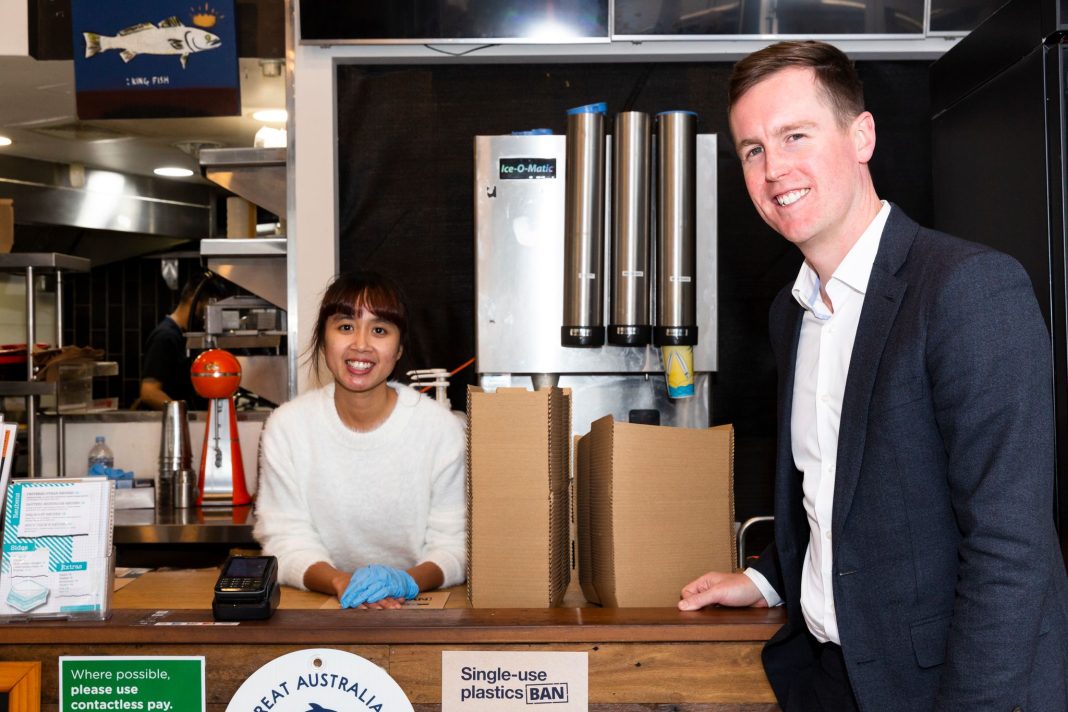From 1 July, single-use plastic straws, cotton buds with plastic sticks, and all oxo-degradable plastics will be banned in the ACT, no longer able to be sold or supplied.
“The ACT Government has making it simple and easy for Canberrans to cut waste,” said Chris Steel, ACT Minister for Transport and City Services.
These are in addition to the single-use plastics items already banned in the ACT since 2021: single-use plastic cutlery and drink stirrers, expanded polystyrene takeaway food and beverage containers, and plastic bags that are less than 35 microns in thickness.
- More major ACT events to go single-use plastic free
- Canberra’s public events will be plastic-free
- ACT’s single-use plastic ban to start in July
An exemption applies to single-use plastic straws.
“We recognise that single-use plastic straws are a safety and accessibility tool for some Canberrans with a disability,” Mr Steel said.
The plastic straw exemption means:
- Businesses – such as cafés and restaurants – are allowed to supply individuals with single-use plastic straws upon request. No reason or proof of need is required, but it is also not compulsory for businesses to stock plastic straws.
- Healthcare entities that provide care or products to people with a disability or healthcare need are allowed to stock, supply, and sell single-use plastic straws. Examples of healthcare entities include aged care or disability facilities or pharmacies.
The ACT Government is working with local and national partners to ensure local businesses and organisations are aware of the upcoming ban.
“This next phase of our single use plastics ban will ensure a level playing field by seeing all businesses make the switch to more sustainable alternatives at the same time,” Mr Steel said.
Mr Steel thanked businesses and organisations that have already made the switch “for embracing alternative products and helping make Canberra a more sustainable city”.
“Over the past 12 months, we have been engaging with a wide range of stakeholders about these bans to ensure the needs of all Canberrans continue to be met as we phase out these products.”
“Retailers are eager to comply, and we will continue to work with government to seek clarity for businesses,” said David Stout, policy director at the National Retail Association.
“We are visiting retail shopping centres, malls and strips across the ACT, visiting over 800 retailers in their stores to provide resources and information.”
Businesses can contact the NRA’s tollfree hotline 1800 844 946 to speak to their plastic ban specialists.
Australian Marine Conservation Society concerned
The Australian Marine Conservation Society (AMCS) said it was pleased the ACT Government would ban marine wildlife-killing single-use plastic, but top ocean conservationists were alarmed the ACT government had broken its commitment to ban plastic fruit and vegetable produce bags this year.
AMCS plastics expert Shane Cucow said when the ACT introduced its plastics laws in 2020, the government committed to act on the “wasteful” plastic produce bags next.
“Overwhelmingly, the public supported a ban on these items, as evidenced in the results of government consultations, so we are disappointed to see them renege on this commitment,” Mr Cucow said.
“Soft plastic bags are among the most dangerous plastics for seabirds, turtles, and marine mammals, causing life-threatening blockages or internal injuries when eaten.
“While we are pleased to see the ACT phasing out plastic straws, cotton bud sticks, and oxo-degradable plastics in this latest ban, we urge the ACT government to listen to the community who have overwhelmingly called for greater ambition.”
AMCS also highlighted the government’s choice not to ban disposable plastic plates. Although the ACT was among the first jurisdictions to ban single-use plastics, it is the only jurisdiction with a ban that does not include single-use plastic plates and bowls.
“Sadly, by choosing not to ban these plastic killers, the ACT is now one of the least ambitious jurisdictions in the fight against ocean plastic pollution, falling behind states such as Western Australia, New South Wales, and Queensland, who have all banned items like plastic plates and bowls,” Mr Cucow said.
Despite the step backwards, Mr Cucow said it was promising that the latest ban included oxo-degradable plastics, describing the plastic as a “textbook case of greenwashing”. While described as ‘biodegradable’, oxo-degradable plastics have chemicals added to make them fragment more quickly, but they persist as microplastics in the environment.
“There are plenty of genuinely compostable alternatives widely available, but with greenwashing rife, it’s hard for people to know which items to choose,” Mr Cucow said. “It’s time to put our wildlife first, and crack down on false solutions.”



